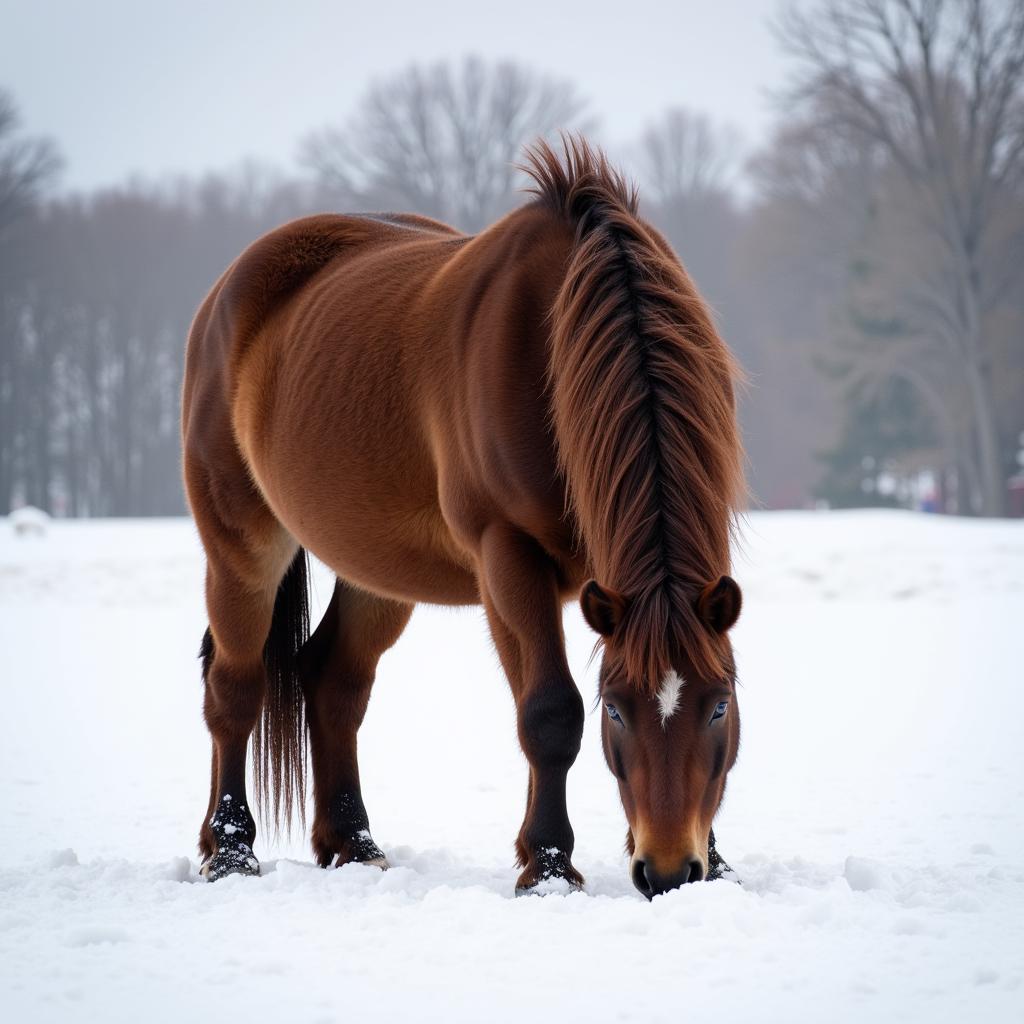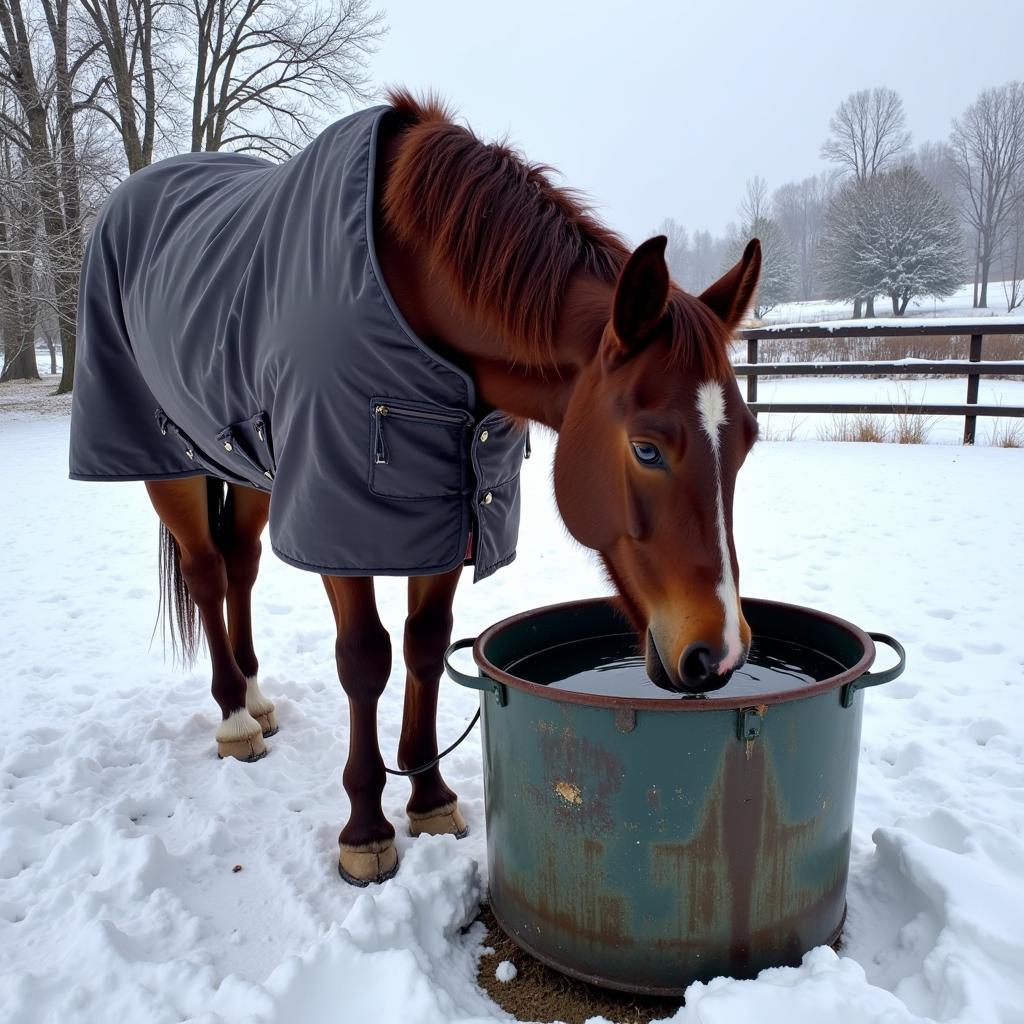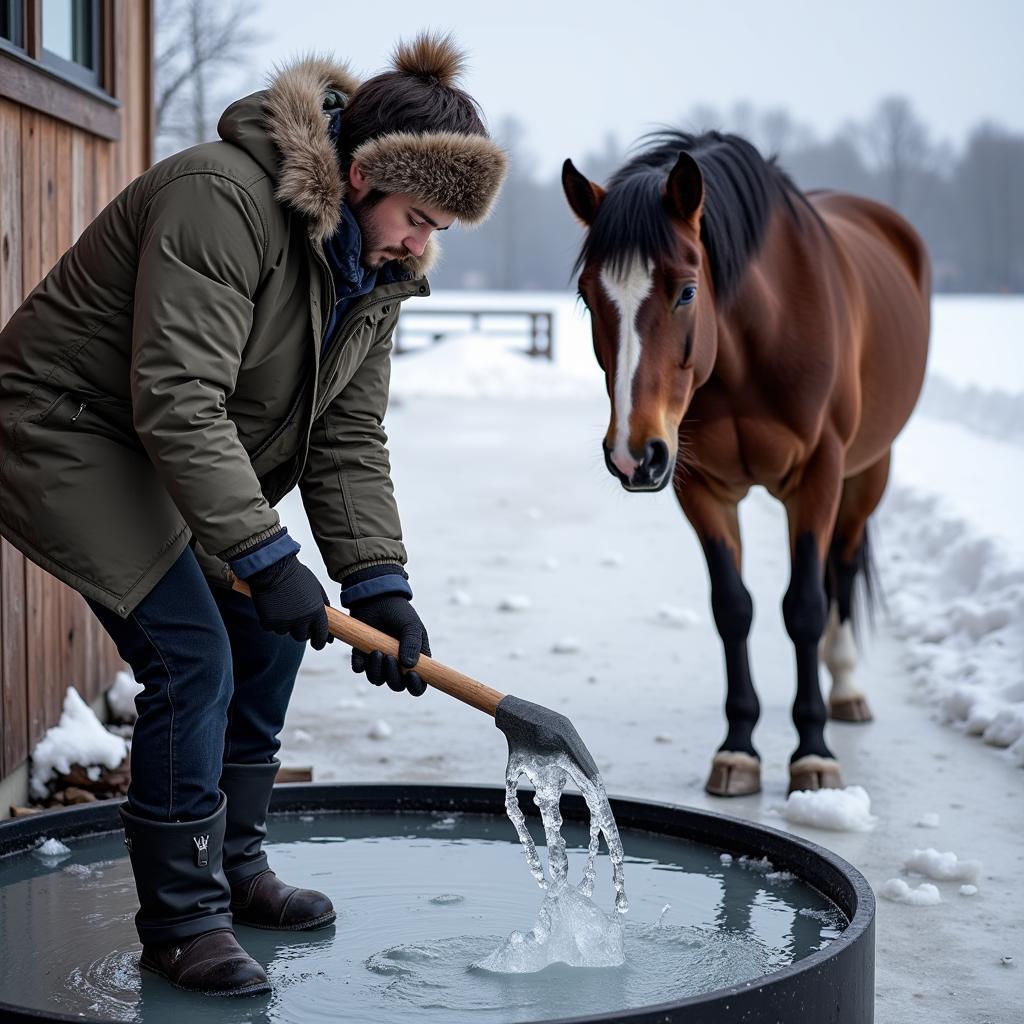Horses, being the majestic creatures they are, often pique our curiosity, especially when it comes to their dietary habits in winter. You might wonder, “Do Horses Eat Snow?” The answer, like many things in equine care, is: it depends.
To Eat or Not to Eat: Snow as a Water Source
 Horse Eating Snow in a Winter Field
Horse Eating Snow in a Winter Field
While horses primarily need water in its liquid form, they may nibble on snow, particularly when access to their usual water sources is limited. Think of it as a horse’s way of quenching their thirst when a refreshing trough seems miles away.
However, relying solely on snow for hydration isn’t ideal.
The Downside of a Snowy Diet: Why Water is Best
 Horse Drinking from a Heated Water Trough
Horse Drinking from a Heated Water Trough
Here’s why providing fresh, unfrozen water is crucial, even during the chilliest months:
- Energy Conservation: Melting snow expends energy that horses need to stay warm in cold temperatures.
- Risk of Impaction: Eating large quantities of snow can increase the risk of impaction colic, a serious digestive issue.
- Temperature Fluctuations: Cold snow can lower a horse’s body temperature, making it harder for them to maintain warmth.
“Imagine asking a human to survive solely on ice chips,” says Dr. Emily Carter, a veterinarian specializing in equine care. “While it might provide some hydration, it’s not a sustainable or healthy long-term solution.”
Ensuring Adequate Hydration in Winter: Tips for Horse Owners
 Horse Owner Checking Water Trough in Winter
Horse Owner Checking Water Trough in Winter
- Check Water Sources Frequently: Ensure troughs are ice-free and filled with fresh water at least twice a day.
- Invest in Heated Water Troughs: Heated troughs are a worthwhile investment, especially if you live in an area with prolonged freezing temperatures. You can learn more about insulated water troughs for horses on our website.
- Offer Warm Water: Horses often prefer lukewarm water in winter. Consider adding hot water to their troughs to take the chill off.
- Monitor Intake: Keep an eye on your horse’s water intake. A decrease in drinking can be a sign of a problem.
Beyond Hydration: Other Winter Dietary Considerations
Remember, horses need more than just water to thrive in winter. Here are some additional tips:
- Increase Forage: Hay and other forages provide warmth from the inside out as horses digest them.
- Consider Blanketing: A well-fitted blanket can help horses conserve energy and stay warm, especially if they are clipped or have a thinner coat. Check out our guide on blanket horse design for optimal warmth and comfort.
- Provide Salt and Mineral Supplements: Electrolyte loss can occur in winter, even without sweating. Offer a salt lick or supplement to encourage drinking.
Do Horses Eat Snow? A Recap
While horses might nibble on snow occasionally, it shouldn’t be their primary source of hydration. Providing access to fresh, unfrozen water is essential for their health and well-being throughout the winter months.
By following these tips, you can ensure your equine companions stay happy, hydrated, and ready to brave the cold. For more information on caring for your horse year-round, explore our other resources on topics like ear covers for horses and belly balm for horses.
Frequently Asked Questions
1. Can eating snow make my horse sick?
While a few bites are usually harmless, eating large quantities of snow can lead to colic and other digestive issues.
2. How much water should my horse drink in winter?
On average, a horse should drink at least 10 gallons of water per day, even in winter. This amount can vary based on factors like size, activity level, and weather conditions.
3. What are signs of dehydration in horses?
Signs of dehydration include lethargy, loss of appetite, sunken eyes, and dry gums. If you notice any of these signs, contact your veterinarian immediately.
4. Do I need to break ice on my horse’s water trough multiple times a day?
Yes, especially during periods of freezing temperatures. Check water sources at least twice daily to ensure they are ice-free and accessible.
5. Can I give my horse warm water to drink?
Yes, many horses prefer lukewarm water in winter. Adding hot water to their trough can encourage drinking and prevent the water from freezing too quickly.
Need More Help?
If you have any further questions or concerns about your horse’s health and well-being, don’t hesitate to reach out to us. Contact us at Phone Number: 0772127271, Email: [email protected] Or visit us at: QGM2+WX2, Vị Trung, Vị Thuỷ, Hậu Giang, Việt Nam. We have a 24/7 customer support team.